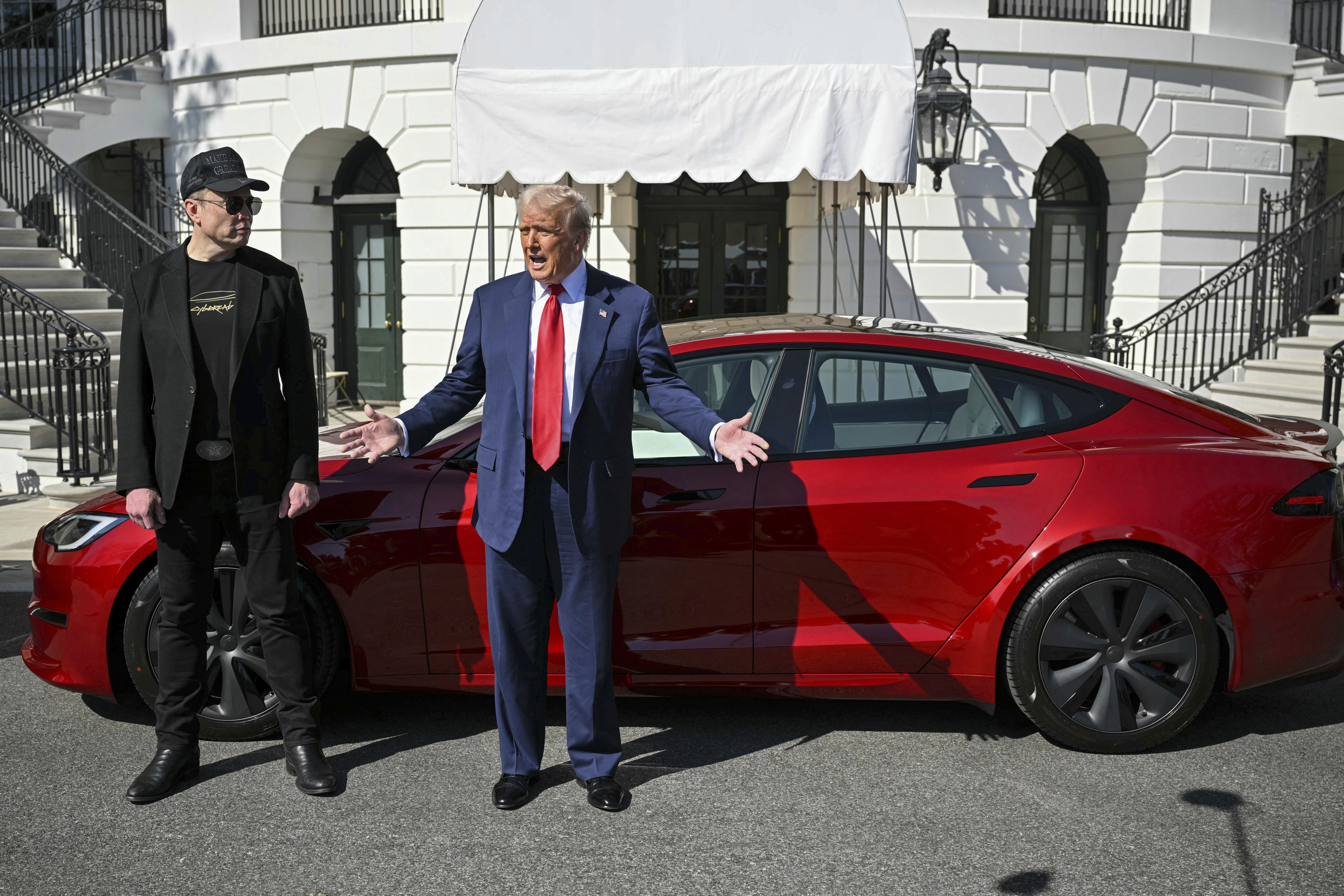
President Donald Trump moved Thursday to eliminate California’s nation-leading vehicle emissions standards, upending strict rules that had become a template for states across the nation to realize their greenhouse gas ambitions.
Trump signed three Congressional Review Act resolutions rolling back a trio of California's rules at a White House signing ceremony, delivering on his Day 1 executive order to quickly roll back electric vehicle mandates around the country.
"We officially rescue the US auto industry from destruction by terminating California's electric vehicle mandate, once and for all," Trump said at a Oval Office signing alongside House Speaker Mike Johnson (R-La.), Transportation Secretary Sean Duffy, Energy Secretary Chris Wright and EPA Administrator Lee Zeldin.
The president, in a wide-ranging speech before the signing, used the moment to hit on a range of issues, including inflation, his disdain for windmills and his recent fallout with Tesla CEO Elon Musk.
"Now we know why Elon doesn't like me so much," Trump quipped, before saying that Musk never asked him to save EV rules and that their break was over other "smaller things."
While the Trump administration has also gone on the offensive against federal vehicle standards, California’s regulations aimed at phasing out gas-powered passenger vehicles and heavy-duty diesel trucks — which are followed by a dozen other states — have drawn the stiffest opposition from the auto and fossil fuel industries.
“Worse than unachievable, these EV mandates were going to be harmful,” said John Bozzella, president and CEO of the Alliance for Automotive Innovation. “Harmful to auto affordability, to consumer choice, to industry competitiveness and to economic activity."
The move takes place against the backdrop of worsening relations between Trump and Gov. Gavin Newsom, with the president ordering the military to quell unrest in Los Angeles over immigration raids. It also comes as Tesla CEO and former White House adviser Elon Musk clashed with Trump last week over electric vehicle policies.
Trump's signature revokes the Golden State's unique permission to exceed federal vehicle pollution standards, which it's used for decades to set nation-leading rules. A dozen other Democrat-led states have opted to follow California's rules, representing one-third of the U.S. auto market.
California's regulations aim to require automakers to sell increasing percentages of zero-emission vehicles, culminating in a 2035 target of all new-car sales being electric or otherwise carbon-free.
Trump had targeted California's rules in his first term and on the campaign trail for his second term. EPA Administrator Lee Zeldin asked Congress to revoke them using the Congressional Review Act, which allows Congress to overturn rules passed in the waning days of the previous administration.
The request triggered a debate among Republicans about whether to stretch congressional norms by using the CRA to roll back California's rules, which Senate Parliamentarian Elizabeth MacDonough and the nonpartisan Government Accountability Office have said aren't subject to the law.
In addition to the rules for passenger vehicles, Thursday's signings roll back California's authority to enforce zero-emission sales targets for commercial trucks and higher standards for heavy-duty diesel engines.
The fight over whether Congress acted lawfully will now head to the courts. California Attorney General Rob Bonta announced immediately after Trump signed the resolutions that he and 10 other state attorneys general had sued to preserve the emissions standards, calling Republicans' move an "unprecedented and illegal use of the CRA."
“We made a promise that if the president attempted to illegally interfere with our clean air standards, we'd hold him accountable in court,” Bonta said. “Today, we are making good on that promise.”
The outcome of that court case will have widespread implications, as Democratic leaders seek to wean drivers and industry off fossil fuels and hit lofty greenhouse gas emissions reduction goals.
But the question is especially acute for California, which has struggled for decades to reduce the nation's worst smog in the Los Angeles area and Central Valley and comply with federal air quality standards under the Clean Air Act. Failure to reach those standards could result in sanctions and withholding of federal highway funds, which both Republican and Democratic administrations have floated in the past.
Trump’s EPA threatened sanctions against the state in 2019, just days after the agency revoked an earlier version of its electric vehicle rules.
“It is hard to imagine that they will not threaten sanctions,” said Ann Carlson, who was head of the National Highway Traffic Safety Administration under former President Joe Biden. “The president clearly has it out for California, and Los Angeles is obviously in his sights.”
EPA said in a statement when asked about the possibility of sanctions that it will enforce the Clean Air Act.
“EPA will continue to implement the Clean Air Act as provided in law and will continue to hope that California can get into attainment after decades of nonattainment,” the agency said.
EPA could develop its own plan for California to meet federal standards, though air quality experts say that’s unlikely because the agency would have to take unpopular steps like restricting driving.
California Air Resources Board spokesperson Lindsay Buckley said in a statement that without the waivers, the state will need to find an alternative to reach compliance.
CARB chair Liane Randolph told state lawmakers during a hearing last month that she’s “confident California will prevail in litigation,” but that could take years, during which the rules are not enforceable.
Randolph suggested that the state could consider approaches like district emissions rules for “indirect sources” like warehouses that attract commercial trucks, incentives to encourage EV purchases and putting more funding towards public transit.
Comments
Post a Comment